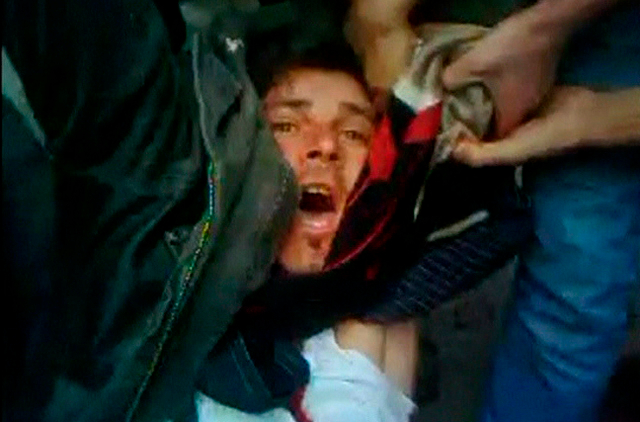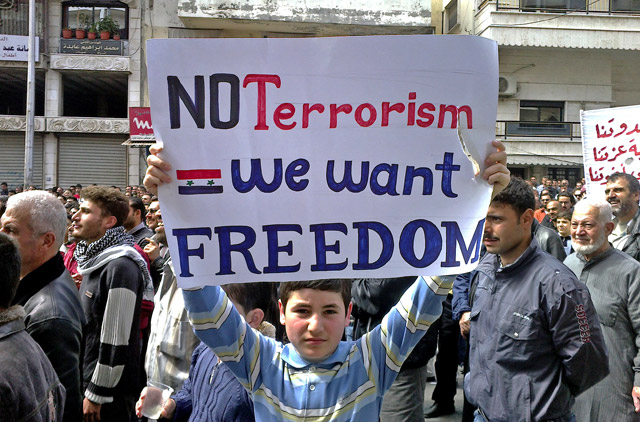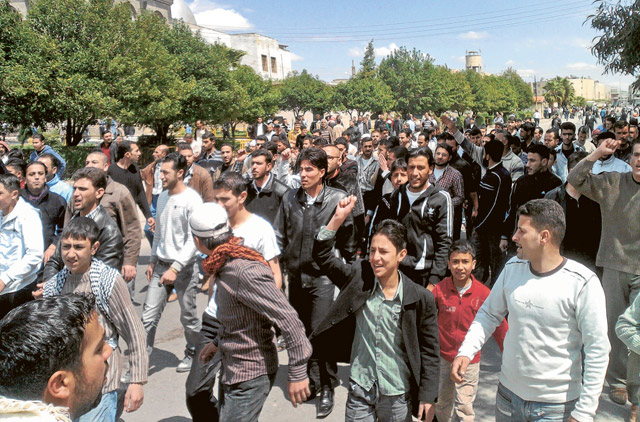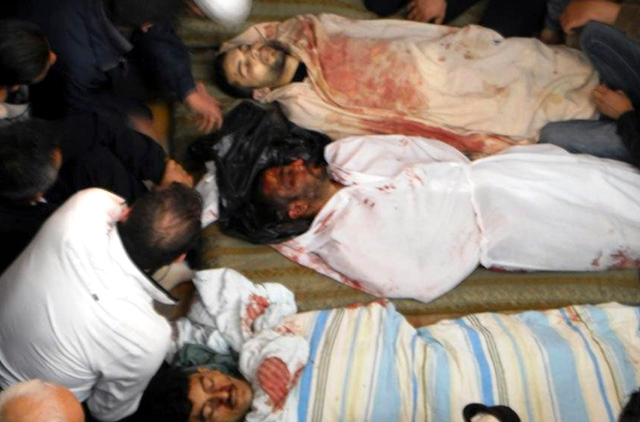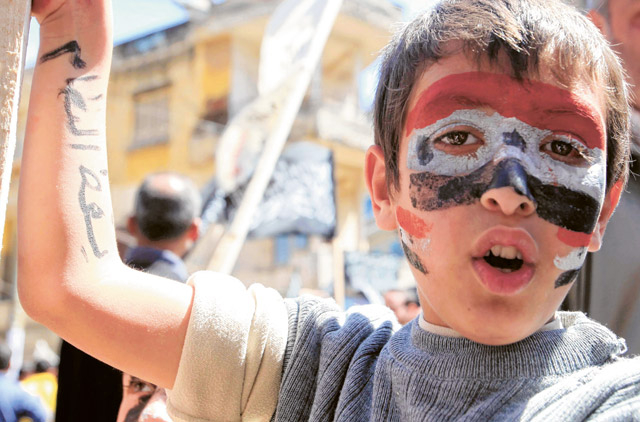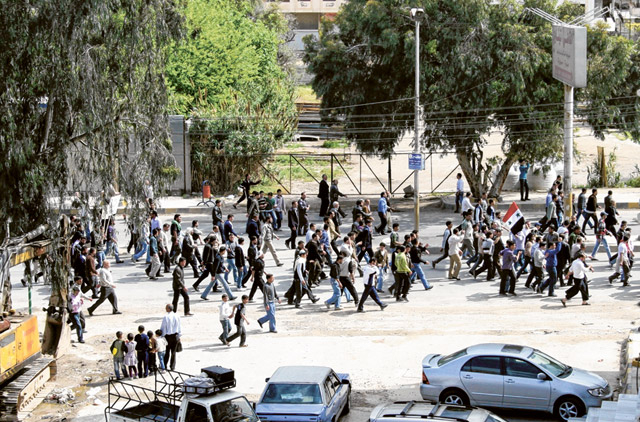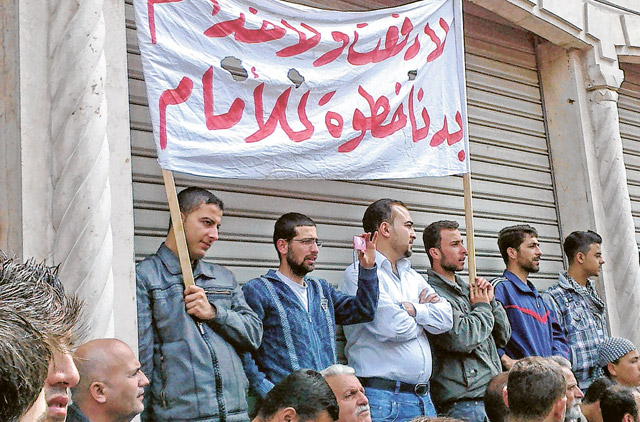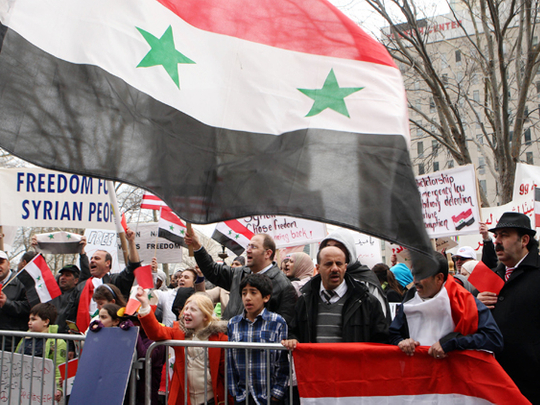
Damascus: Two Syrian MPs from the protest hub city of Daraa on Saturday told Al Jazeera television they were quitting parliament in protest at the bloodshed in their country.
"I announce my resignation from parliament," Khalil Al Rifai, a deputy from the southern city said in remarks broadcast by Al Jazeera.
The satellite channel said he became the second MP from Daraa to quit after Nasser Al Hariri, who earlier announced his resignation also on Al Jazeera, saying he was frustrated because he could not protect his constituents.
Rifai echoed the sentiment, saying he could not "protect the people who brought me to parliament."
"I urge the president to intervene immediately," said Rifai, who became the first MP to quit since anti-regime protests in the country erupted on March 15.
Syrian security forces killed 12 civilians during protesters' funerals on Saturday, Syrian human rights organisation Sawasiah said.
Many of those killed on Friday and Saturday fell in the region of Daraa, in the south of the country.
In Douma on Saturday, snipers shot dead at least three mourners while funerals were underway for several protesters killed the previous day, witnesses said.
Scores of pro-democracy protesters killed by security forces will be buried across Syria in funerals expected to attract large crowds on Saturday and fuel mounting defiance against authoritarian rule.
A group of activists coordinating the demonstrations said regular forces and gunman loyal to President Bashar Al Assad shot dead at least 88 civilians on Friday. Rights groups had earlier put the death toll at a minimum of 70.
The Local Coordination Committees activist group sent Reuters a list with names of 88 people classified by region. The group said they were killed in areas stretching from the port city of Latakia to Homs, Hama, Damascus and the southern village of Izraa.
It was by far the bloodiest day yet in a month of demonstrations demanding political freedoms and an end to corruption in the country of 20 million people.
"The funerals will turn into vehement protests, like past funerals," a Syrian human rights campaigner said. "When you have security services who are thugs it is difficult to think that they will not shoot at the crowds. Another cycle of funerals and demonstrations is likely to follow," the rights campaigner said from the Syrian capital.
Condemnation
US President Barack Obama condemned Friday's violence and accused Al Assad of seeking help from Iran. "This outrageous use of violence to quell protests must come to an end now," Obama said in a statement. "Instead of listening to their own people, President Al Assad is blaming outsiders while seeking Iranian assistance in repressing Syria's citizens...."
France's Foreign Ministry said Paris was "deeply concerned". "Syrian authorities must give up the use of violence against their citizens. We again call on them to commit without delay to an inclusive political dialogue and to achieve the reforms legitimately demanded by the Syrian people."
Too little too late
Friday's protests went ahead despite Al Assad's decision this week to lift the country's hated emergency law, in place since his Baath Party seized power 48 years ago.
A statement by the Local Coordination Committees said the end of emergency law was futile without the release of thousands of political prisoners - most held without trial - and the dismantling of the security apparatus.
In their first joint statement since the protests erupted last month, the activists said the abolition of the Baath Party's monopoly on power and the establishment of a democratic political system was central to ending repression in Syria.
Aided by his family and a pervasive security apparatus, Al Assad, 45, has absolute power, having ignored demands to transform the anachronistic autocratic system he inherited when he succeeded his late father, Preident Hafez Al Assad, in 2000.
Friday's violence brings the death toll to about 300, according to rights activists, since the unrest which broke out on March 18 in the southern city of Daraa.
Protests swept the country on Friday, from the Mediterranean city of Baniyas to the eastern cities of Deir Al Zor and Qamishli. In Damascus, security forces fired teargas to disperse 2,000 protesters in the district of Midan.
Amnesty International said Syrian authorities "have again responded to peaceful calls for change with bullets and batons".
"They must immediately halt their attacks on peaceful protesters and instead allow Syrians to gather freely as international law demands," said Malcolm Smart, Amnesty International's Middle East and North Africa director.
Syrian television said eight people were killed and 28 wounded, including army personnel, in attacks by armed groups in Izraa. It said an armed group had attacked a military base in the Damascus suburb of Muadhamiya.
UN leader Ban Ki-moon condemned the Syrian government for the killing of scores of demonstrators on Friday and renewed calls for a "transparent" independent investigation.
"The secretary-general condemns the ongoing violence against peaceful demonstrators in Syria, which again has killed and injured many today, and calls for it to stop immediately," said UN deputy spokesman Farhan Haq.
Bloody Friday
Syrian security forces fired bullets and tear gas Friday at tens of thousands of protesters across the country, killing more than 75 people in the bloodiest day of the monthlong uprising and signalling that the authoritarian regime was prepared to turn more ruthless to put down the revolt against President Bashar Assad.
Among the dead were a 70-year-old man and two boys ages 7 and 10, Amnesty International said.
In the southern town of Izraa, a man ran carrying the body of a young boy, whose hair was matted with blood from a gaping wound on his head, as another child wept and shouted, "My brother!" Footage of the scene was posted on the protest movement's main Facebook pace.
For the first time, protests swept through every Syrian city and province including Damascus, Daraa, Douma, Hama, Jabla, Kamishli and 20 other Syrian towns for what was dubbed Good Friday protests.
An estimated 10,000 people took to the streets in the city of Salamiya near Hama for the first time since the uprising movement began.
"The churches in Daraa were opened for the people who were injured in the protests and Syrians proved once again that they are united regardless of their religious differences and sectarian backgrounds," Shaikh Ahmad Al Sayasneh, the Imam of Al Omari Mosque in Daraa, said.
Overthrow of regime
Video footage posted on the internet showed a dead man, allegedly shot by security forces, lying near the Damascus city centre. More than 200 people have been killed so far by the security forces in five weeks of unrest.
"The people want the overthrow of the regime," they chanted in the city of Douma, near Damascus, as they marched, using a provocative slogan borrowed from revolutions in Tunisia and Egypt, which have inspired a wave of unrest against dictatorial regimes throughout the Arab world.
"We want everyone to hear that ‘the people want the overthrow of the regime,'" a protester in Douma said via telephone as angry cries could be heard in the background.
Aleppo remained relatively calm with only scattered protests by fewer people. Analysts attributed the calm in the country's largest populated city to the popularity of the president among its residents.
President Bashar Al Assad met with social and industrial figures in the city on Wednesday to listen to their demands. He was quoted as promising to pursue the demands of the city, most of which focused on economic and organisational issues.
"The two envoys pledged support to President Al Assad and said the city will support his reform efforts," a source from the Aleppo envoy to the meeting with the president told Gulf News.
The message to the president from the Good Friday protesters was that revoking the emergency law and allowing licensed protests are not what the people want at this stage, according to Najati Tayyara, vice-chairman of the Syrian Human Rights Society.
"People need more serious reforms including redefining the role of the security apparatus in the civil life of the country," he said.
Human rights lawyer Razan Zeitouneh said the new legislation was born dead, because the government is not sincere in enforcing it.
"When a lawyer from the northeastern city of Hasaka applied to register a protest in the city at the governance office, it was rejected and he was detained for 10 hours of questioning during which he was mistreated," Zeitouneh said.
With input from agencies


